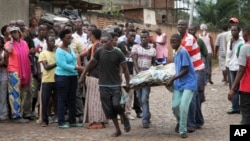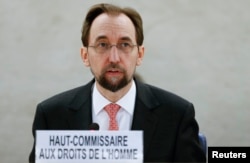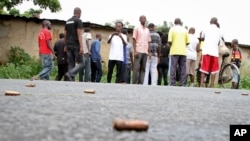U.N. human rights officials warn Burundi is on the verge of civil war and the international community must take action to avert a looming catastrophe. The call came at a special day-long session of the U.N. Human Rights Council on the deteriorating Burundi situation.
U.N. High Commissioner for Human Rights Zeid Ra’ad Al Hussein opened an emergency session of the council by describing escalating atrocities, intimidation, and hate speech in Burundi, saying it harked back to that country’s "deeply troubled, dark and horrendously violent" past.
“Burundi is at bursting point, on the very cusp of a civil war... The time for piecemeal responses and fiddling around the edges is over. The situation in Burundi demands a robust, decisive response from the international community,” Zeid said.
The high commissioner said at least 400 people have been killed since April 26, when Burundi’s President Pierre Nkurunziza announced his intentions to run for a third term, considered by critics to be unconstitutional.
He said dozens of people may have been extra-judicially executed in November, some 3,500 have been arbitrarily arrested, and nearly one-quarter of a million people have fled to neighboring countries in fear of their lives.
Zeid called for a robust response by the international community, including travel bans and asset freezes, and said Burundi's borders should be closely monitored, perhaps by drones, to stop the reported flow of weapons into the country.
Warning signs
The U.N. secretary-general’s special adviser on the prevention of genocide, Adama Dieng, said there were clear warning signs in Burundi of potential atrocities.
“In a speech on 29 October that received much attention, Reverien Ndikuriyo, the president of the senate, used inflammatory and threatening language that could constitute incitement to violence. Some of the language used was very similar to the language used before and during the Rwandan genocide,” Dieng said.
Hutu extremists killed about 800,000 people, mainly Tutsis, in the 1994 Rwandan genocide.
Despite the warnings and condemnations by delegates, the government of Burundi was not persuaded it had a case to answer.
Speaking through an interpreter, Burundian representative Elisa Nkerabirori accused the opposition of undermining democratically elected institutions.
“The government of Burundi today seeks a firm condemnation by the international community as regards the radical opposition, which is organizing attacks against Burundi from the outside,” Nkerabirori said.
She added her government favored inter-Burundian dialogue as the only way to resolve socio-political problems in Burundi. On this point, the international community was in agreement.
UN probe sought
The United States has proposed a U.N. team be sent to Burundi to investigate the violence and recommend steps to ease the situation. The council members were expected to vote on such a measure later Thursday.
Zeid said the International Criminal Court should also be involved, a call backed Dieng, who said Burundi appeared to be "on the verge of a descent into violence that could escalate into atrocity crimes."
The international community should consider establishing a commission of inquiry to investigate human rights violations, with a view to prosecuting those responsible, Dieng said.
"No one should underestimate what is at stake. A civil war between 1993 and 2005 cost over 300,000 lives and displaced more than 1 million people," Dieng said.
Burundi's 12-year civil war pitted rebel groups of the Hutu majority, including one led by the current president Nkurunziza, against what was then an army led by the Tutsi minority.
Rwanda has a similar ethnic mix.
AU reaction
The African Union has issued a separate call to end to the violence in Burundi, warning it will not allow the country to descend into genocide.
Echoing U.N. concerns, the AU Peace and Security Council said Thursday on Twitter that "Africa will NOT allow another genocide to take place on its soil."
AU Commissioner for Peace and Security Smali Cherugi added that Council members meeting in Addis Ababa have a very clear message: "The killings in Burundi must end immediately."






